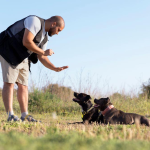The definition of positive reinforcement in regards to dog training is not as simple as one might think. The basic principle behind the term is that a dog trained rewards the positive behaviors and ignores, not punishes, the negative behaviors that a dog exhibits. In truth, positive reinforcement is better understood by explaining the four core philosophies behind it.
The 4 Core Pillars: A Brief Overview
The concept of positivity- based Dog Training is defined by the use of positive reinforcement, avoiding intimidation, fear, or physical punishment, an awareness of the misunderstood concept of dominance, and a dedication to the understanding of the canine experience from a dog’s viewpoint.
The Use Positive Reinforcement
The concept of positive reinforcement has been studied and proven effective by many people in the animal behavioral science field. Essentially, the act of rewarding behavior that a trainer wants the dog to exhibit will increase the chances of that behavior happening again. A reward needs to be something that the dog is motivated to work for, such as food, a toy, affection, or playtime. The desired behavior is marked immediately, and the reward quickly follows.
Avoiding Intimidation, Fear, or Physical Punishment
Using punitive methods for dog training has been proven to be ineffective in eliciting positive behaviors long term. Not only is it ineffective, but it can make a dog aggressive, especially if they have already exhibited some aggressive behaviors previously. Some old-school dog trainers may argue that a soft shock or tap is not that serious. There are indeed different levels of physical punishment, but anything that makes a dog feel pain or fear has the potential to exacerbate aggressive behavior.
The Misunderstood Concept Of Dominance
The collective misunderstanding of the concept of dominance is the greatest challenge that a dog trainer faces regarding the development of a functional, healthy relationship with a dog. It is not uncommon to hear someone use the terms “pack leader,” “alpha,” or “top dog” when talking about their relationship with their dog. The reality is that a dog’s bad behavior is never an attempt to assert dominance over a person. It is essential that a trainer familiarizes themselves with the concept of dominance from a dog’s point of view and avoid misdiagnosing the dog’s behavior as an attempt to surpass the trainer’s position of power.
Understanding A Dog’s Point Of View
It is impossible to develop a strong bond with a dog without also understanding their point of view. To understand a dog’s perspective, it is vital to understand their methods of communication and sensory experience. Anyone who feels a pang of longing from a familiar smell knows that emotions are heavily tied to the senses. This is no different for dogs, and given that a dog’s sense of smell far surpasses that of a human, it is reasonable to assume that they play a huge role in a dog’s experience. Additionally, humans have superior intelligence, leaving the responsibility of developing a relationship with a dog up the human.
In Conclusion
Though positive reinforcement-based training is a complex concept, it is the best way to both train and develops a healthy relationship with a dog. Rewarding positive behaviors is a critical component of this method of training. When that is coupled with avoiding punitive training and a distinct understanding of the canine experience, the result is a truly happy dog.








Pingback: Six Dog Walking Safety Tips All Dog Owners Should Know | My Beautiful Adventures